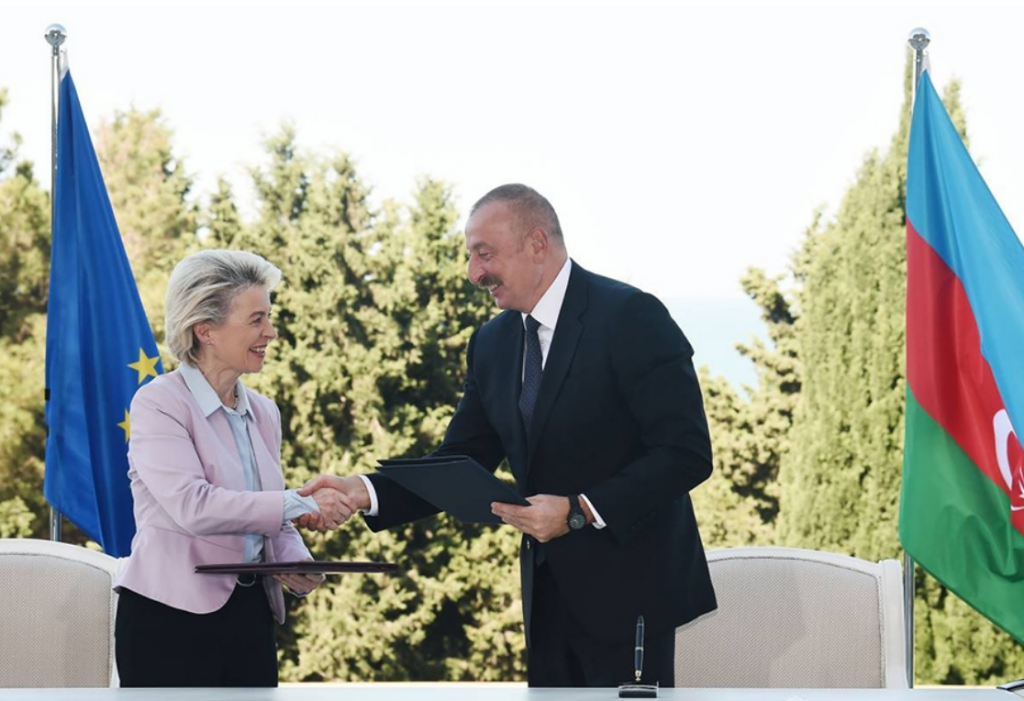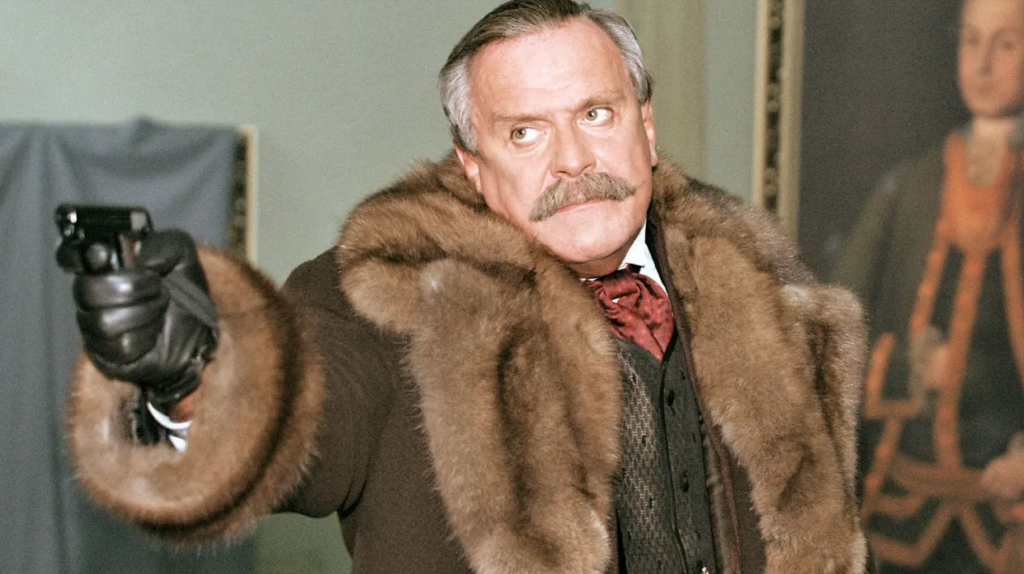The Jordan Center stands with all the people of Ukraine, Russia, and the rest of the world who oppose the Russian invasion of Ukraine. See our statement here.
This post features a Judges' Choice entry in the Jordan Center Blog's third annual Graduate Student Essay Competition.
Drew Morrison is a writer and special educator from Albuquerque, currently based in Brooklyn. He is pursuing his MA in International Affairs and Global Justice at Brooklyn College while teaching in the NYCDOE. He holds an MA in Dramatic Writing from the University of New Mexico, and his plays have received productions and staged readings in Albuquerque and New York.
In July 2022, Azerbaijan signed a new “Memorandum of Understanding on a Strategic Partnership in the Field of Energy” with the European Commission (EC), which will “double the supply of gas from Azerbaijan to the European Union.” EC President Ursula von der Leyen described Azerbaijan and President Aliyev as trusted partners, saying that even before "Russia’s brutal invasion of Ukraine," Russian gas supplies to Europe were somewhat unreliable. As a result, she continued, the EU has "decided to diversify away from Russia and to turn towards more reliable, trustworthy partners. And I am glad to count Azerbaijan among them." President von der Leyen thus made clear that Azerbaijan’s oil and gas were an integral part of transitioning away from Russian exports. The new Memorandum includes “a commitment to double the capacity of the Southern Gas Corridor to deliver at least 20 billion cubic meters to the EU annually by 2027.” Azerbaijan’s history of corruption and oppression are second to the fact that “the European Union is the first commercial partner of Azerbaijan; its first export destination; and one of its most important sources of investments.”
In the same year that EC officials praised Azerbaijan’s reliability as an oil supplier, Freedom House noted that “reactionary forces in society targeted vulnerable groups, particularly women and the LGBT+ community, leading to a spike in hate speech and violence.” Media in Azerbaijan is either state-run or censored, with independent journalists “regularly fac[ing] illegal surveillance, harassment, and imprisonment.” Presidential reforms begun in 2021 “are likely to make the environment even more restrictive.” Last September, a video emerged apparently showing Azeri forces executing seven Armenian POWs, which, if true, constitutes a war crime.
President Ilham Aliyev has been in office since 2003, when he replaced his father Heydar Aliyev, who had been president since 1993. Freedom House considers Azerbaijan a “consolidated authoritarian regime and gives it scores of 1.07/7 for Democracy, 9/100 for Global Freedom, 38/100 for Internet Freedom, and a total score of 1/100. (Ursula von der Leyen’s home country of Germany, by contrast, earned 94/100 in Global Freedom.)
Aliyev’s continued power is ensured by policy changes and corrupt elections. Presidents are eligible for unlimited terms in Azerbaijan, and a Constitutional amendment in 2016 extended terms from five to seven years. 2020 elections were held nine months early, police detained twenty opposition and independent candidates for protesting the results, and, as the Organization for Security and Co-operation in Europe reported, Aliyev won reelection with a suspiciously high 86% of the vote. Criticism of the regime is met with abuse, extortion, and arrests on trumped-up charges—drug possession being a particularly popular choice.
Despite this reputation for human rights problems, President von der Leyen’s statement focused on the advantages of energy partnership with Azerbaijan. Clean energy earned only a passing mention: “gradually, Azerbaijan will evolve from being a fossil fuel supplier to becoming a very reliable and prominent renewable energy partner to the European Union.” Civil rights received even less attention, and were euphemistically framed as obstacles standing between Azerbaijan and its economic potential. Eliding the country’s record of human rights abuses, von der Leyen spoke of “[creating] the right conditions for investor confidence” by cultivating “civil society” and “a free and independent media.” This framing already implies that oil is the most important factor to all players involved. Moreover, green initiatives and civil rights campaigns appear toothless in the closing paragraphs of a speech lauding an already signed deal, which increases the EU’s supply of Azeri oil from its current 8 billion cubic meters to 20 billion cubic meters in a few years. For Aliyev, “investor confidence” must already appear rather high.
The EC’s continued drilling and purchasing of oil does not encourage policy reform in Azerbaijan. Rather, it might make reform impossible. Mayis Gulaliyev, a politician for the Green Party of Azerbaijan, described the “solution to the unsustainable extraction of oil and gas” as simple: “stop drilling for oil and gas.” The only people profiting from this extraction are, in any case, affiliated with the ruling party. Gulaliyev concluded wryly: “Of course, if I was actually elected, the CIA would throw me out, saying I’m a Kurdish agent or an Armenian agent.”
A hypothetical nationalized oil industry, or at least a more democratic Azerbaijan where oil profits benefited the people, would mean a much higher price tag per barrel for the oil the EU evidently cannot do without. If the EU and EC’s top priority is the production of affordable, plentiful, non-Russian oil, then Azerbaijan remaining a consolidated authoritarian regime in fact becomes the best way to boost “investor confidence.”
Converting to clean energy may indeed require further extraction of oil and raw materials to fuel the transition, true to the adage “spend money to make money.” The new Memorandum is the first step in a process that makes “full use of the potential of civil society, while underscoring the importance of human rights and the rule of law.” However, it is as contradictory to encourage development of sustainable energy through prolific extraction of fossil fuels, as it is to emphasize the importance of human rights while doubling business with an authoritarian regime. The “resource curse” is two-sided: reliance on lucrative natural resources like oil not only makes the emergence of an “accountable government” less likely, but also reduces the odds that outside powers—particularly those desperate for oil—will demand governmental reforms.
President Aliyev’s continued tenure and the European Commission’s continued investment in his regime ensure that Azeri oil and its profits remain outside the control of Azerbaijan’s people. If the European Commission does not offer more than lip service to correcting human rights abuses in the closing remarks of speeches lauding fresh deals, there is little incentive for Azerbaijan’s leadership to aim for a Democracy Status of higher than 1/100.



